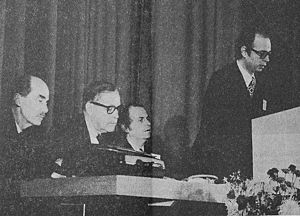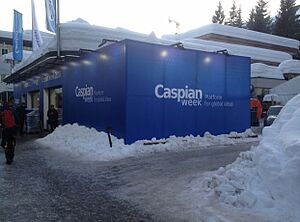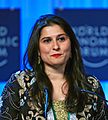World Economic Forum facts for kids
The World Economic Forum (WEF) is a special international group that brings together important people from business, politics, and other areas. It's like a big club based in Cologny, Switzerland. It was started on January 24, 1971, by a German professor named Klaus Schwab.
The main goal of the WEF is to "make the world better" by getting leaders to work together on big global and local issues. Most of its money comes from about 1,000 large international companies that are members.
The WEF is most famous for its yearly meeting held in late January in Davos, a beautiful mountain town in Switzerland. About 3,000 people attend, including business leaders, politicians, economists, famous people, and journalists. They meet for up to five days to talk about many important global challenges.
Besides the Davos meeting, the WEF also holds smaller meetings around the world. It publishes reports, helps members work on specific projects, and creates a space for leaders to team up on new ideas.
Over the years, some people have raised concerns about the World Economic Forum. These include questions about how decisions are made, how transparent its finances are, and the environmental impact of its large meetings.
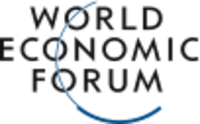 |
|
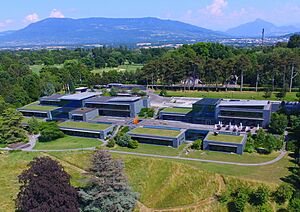
Headquarters in Cologny, Switzerland
|
|
| Formation | 24 January 1971 |
|---|---|
| Founder | Klaus Schwab |
| Type | International NGO, lobbying organisation |
| Legal status | Foundation |
| Purpose | influencing global agendas and decision making, public-private cooperation |
| Headquarters | Cologny, Switzerland |
|
Region served
|
Worldwide |
|
Official language
|
English |
| Peter Brabeck-Letmathe | |
|
President and CEO
|
Børge Brende |
|
Formerly called
|
European Management Forum |
Contents
History of the World Economic Forum
The WEF was started in 1971 by Klaus Schwab, who was a business professor at the University of Geneva. It was first called the European Management Forum. In 1987, its name changed to the World Economic Forum. This change showed its goal to help solve international problems, not just focus on business.
In February 1971, Schwab invited 450 business leaders from Western Europe to the first meeting in Davos. He wanted to teach European companies about American business methods. He then made the WEF a non-profit group based in Geneva.
The second meeting in 1972 was special because a country's leader, Prime Minister Pierre Werner of Luxembourg, spoke there for the first time.
After some big global events in 1973, like changes in money systems and a war, the yearly meeting started to focus on economic and social issues, not just business management. Political leaders were invited to the meeting for the first time in January 1974.
In its early years, the forum had a fun atmosphere. Many members enjoyed skiing and evening events.
Key Moments and Global Impact
Political leaders soon began to use the annual meeting to discuss important issues.
- In 1988, the Davos Declaration was signed by Greece and Turkey, which helped prevent a war between them.
- In 1992, South African President F. W. de Klerk met with Nelson Mandela and Chief Mangosuthu Buthelezi at the meeting. This was their first public meeting together outside South Africa.
- At the 1994 meeting, Israeli Foreign Minister Shimon Peres and PLO chairman Yasser Arafat worked out an agreement about Gaza and Jericho.
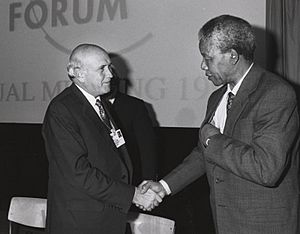
- After the 9/11 attacks, the WEF meeting was held in New York City in 2002 for the first time.
- In January 2003, U.S. Secretary of State Powell attended the forum to gather support for the global fight against terrorism.
- In late 2015, North Korea was invited to the 2016 WEF for the first time since 1998. However, the invitation was taken back after North Korea conducted a nuclear test in January 2016.
- In 2017, the WEF in Davos gained a lot of attention when the leader of China, Xi Jinping, attended for the first time. He spoke about protecting global trade and the environment.
- In 2018, Indian Prime Minister Narendra Modi gave a main speech, talking about climate change, terrorism, and trade issues.
- In 2019, Brazilian President Jair Bolsonaro also gave a key speech, discussing Brazil's role in the world and environmental concerns like the rainforest.
- On June 13, 2019, the WEF and the United Nations agreed to work together to achieve the 2030 Agenda for Sustainable Development, which aims for a better and more sustainable future for everyone.
- The 2021 World Economic Forum meeting was planned for Singapore but was canceled due to the COVID-19 pandemic. It was later rescheduled for May 2022 in Davos.
- Topics at the 2022 meeting included the Russian invasion of Ukraine, climate change, and rising prices. Ukraine's President Volodymyr Zelenskyy gave a special speech. For the first time since 1991, no Russian group attended.
- The 2023 annual meeting in Davos focused on "Cooperation in a fragmented world."
- On April 21, 2025, Klaus Schwab stepped down from his role as Chairman of the Board of the World Economic Forum.
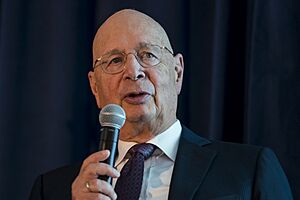
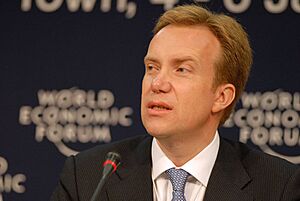
How the World Economic Forum Works
The WEF has its main office in Cologny, Switzerland, and also has offices in New York, Beijing, Tokyo, and Seoul. The Swiss government recognizes it as an international non-governmental organization (NGO).
In 2016, the WEF opened its Center for the Fourth Industrial Revolution in San Francisco. This center helps people understand and work with new scientific and technological changes. The WEF now has 19 such centers around the world.
The World Economic Forum says it is fair and not connected to any specific political group or country. Its main guiding body is the foundation board. The managing board, led by the WEF's president and CEO, Børge Brende, handles the daily operations.
Board of Trustees
The WEF is guided by a board of trustees. This board includes important leaders from business, politics, education, and community groups. As of 2024, the board includes people like Queen Rania of Jordan, Mukesh Ambani, Laurence D. Fink, Chrystia Freeland, Al Gore, Christine Lagarde, and Yo-Yo Ma.
Membership
The WEF is funded by about 1,000 member companies. These are usually large global businesses. They are among the top companies in their industries or countries. Companies pay different fees depending on how much they want to be involved in the forum's activities.
Activities of the World Economic Forum
Annual Meeting in Davos
The most important event for the World Economic Forum is its annual meeting in Davos, Switzerland. This meeting is by invitation only and happens at the end of January. It brings together CEOs from its member companies, along with selected politicians, university experts, leaders from NGOs, religious leaders, and media. They discuss major global issues like globalization, money markets, international conflicts, and environmental problems.
At the 2018 meeting, over 3,000 people from nearly 110 countries took part in more than 400 sessions. This included over 70 heads of state and government. Many journalists also attend, and some sessions are broadcast online.
World Economic Forum 2025 (Davos)
The World Economic Forum 2025 took place in Davos, Switzerland, from January 20 to 24. Its theme was Collaboration for the Intelligent Age. About 3,000 global leaders from over 125 countries attended. This included 350 heads of state and government, business leaders, and representatives from international groups.
Discussions focused on global peace, economic strength, climate change, rules for artificial intelligence, and fair economic growth. Topics also included the future of global trade, moving to cleaner energy, and how AI will affect jobs. New plans were introduced for AI rules, ways to fund climate action, and economic plans for sustainable development.
Important people like Ursula von der Leyen, Antony Blinken, and Sam Altman were there. The meeting highlighted how important it is for countries to work together on global economic and technology challenges.
Summer Annual Meeting
Since 2007, the WEF has also held an Annual Meeting of the New Champions, sometimes called Summer Davos. This meeting takes place every year in China, switching between Dalian and Tianjin. It brings together about 1,500 people from fast-growing companies, especially from countries like China, Russia, Mexico, and Brazil.
Regional Meetings
Every year, the WEF holds regional meetings in places like Africa, East Asia, Latin America, and the Middle East. These meetings help business leaders, local government officials, and NGOs connect and work together on issues specific to those regions.
Young Global Leaders
The Young Global Leaders group is made up of 800 people chosen by the WEF. They are seen as important young leaders of today. After five years, they become alumni of the program.
Social Entrepreneurs
Since 2000, the WEF has supported social entrepreneurs. These are people who create businesses or projects to solve social problems. Selected social entrepreneurs are invited to WEF meetings to meet business and government leaders. For example, at the 2003 meeting, Jeroo Billimoria met with a UN official, which led to an important partnership for her organization, Child helpline international.
Research Reports
The WEF also acts like a "think tank," publishing many reports. These reports focus on topics like how competitive countries are, global risks, and future possibilities.
Some of its yearly reports include:
- The Global Competitiveness Report (since 1979), which measures how competitive countries are.
- The Global Risks Report (since 2006), which looks at major global risks.
- The Global Gender Gap Report, which examines differences between men and women.
In 2020, the WEF published a report called Nature Risk Rising. It said that about half of the world's economy depends on nature. The report also found that every dollar spent on restoring nature can bring nine dollars in economic benefits.
Initiatives
Health Initiatives
On January 19, 2017, the Coalition for Epidemic Preparedness Innovations (CEPI) was launched at the WEF in Davos. This global group aims to make sure there are enough vaccines for global emergencies and to research new vaccines for tropical diseases. It is funded by governments and groups like the Bill & Melinda Gates Foundation.
In January 2020, early in the COVID-19 pandemic, CEPI met with leaders from Moderna at the Davos meeting to plan for a COVID-19 vaccine. This was when there were only 274 known cases of the virus worldwide.
Society Initiatives
The Global Water Initiative brings together different groups to work on water management projects in places like South Africa and India.
To fight corruption, the Partnering Against Corruption Initiative (PACI) was started in 2004. About 140 companies have joined this effort to share experiences and solve problems related to corruption.
Environment Initiatives
The WEF has increasingly focused on environmental issues. The Davos Manifesto 2020 states that companies should protect the environment for future generations and support a "circular economy" where resources are reused.
The Environmental Initiative covers climate change and water. In 2005, the U.K. government asked the WEF to help businesses find ways to reduce greenhouse gas emissions.
In 2017, the WEF launched the Platform for Accelerating the Circular Economy (PACE). This is a global partnership that aims to expand new ideas for a circular economy.
Also in 2017, the WEF started the Fourth Industrial Revolution (4IR) for the Earth Initiative. One project from this initiative is the Earth BioGenome Project, which aims to map the genetic code of every living thing on Earth.
The World Economic Forum is working to stop plastic pollution. It says that by 2050, plastic could use up a large part of the world's carbon budget and outweigh all the fish in the oceans. A circular economy is one way to tackle this.
The theme of the 2020 WEF annual meeting was 'Stakeholders for a Cohesive and Sustainable World'. Climate change was a main topic. Many people argued that economic growth (GDP) doesn't fully show people's well-being. They also said that money given to fossil fuel companies should stop.
At this meeting, the WEF:
- Launched the Trillion Tree Campaign, which aims to "grow, restore and conserve 1 trillion trees over the next 10 years." This is to help restore biodiversity and fight climate change.
- Discussed climate change and called for more renewable energy, better energy efficiency, and changes in how we use resources.
In April 2020, the WEF published an article suggesting that the COVID-19 pandemic is linked to the destruction of nature. It said that the rise in new diseases is connected to deforestation and the loss of animal and plant species. The article concluded that recovering from the pandemic should also involve recovering nature.
The forum suggested a plan for a green recovery. This plan includes promoting a circular economy, green building, sustainable transport, organic farming, and renewable energy.
Global Shapers Community
The Global Shapers Community (GSC) is a WEF program that chooses young leaders under 30. These young people lead local groups to work on social justice projects that support the WEF's mission. The GSC has over 10,000 members in more than 500 cities across 154 countries.
The Great Reset
In May 2020, the WEF and the Prince of Wales's Sustainable Markets Initiative launched "The Great Reset" project. This plan aims to improve sustainable economic growth after the global economic slowdown caused by the COVID-19 pandemic lockdowns. "The Great Reset" was the theme of the WEF's annual meeting in 2021.
According to WEF founder Klaus Schwab, this project aims to rethink what capitalism means. While not getting rid of capitalism, he suggests changing some parts of it, including how corporations work and how taxes are handled. He also believes that international cooperation and trade should be protected.
The WEF calls the system it wants to create "Stakeholder Capitalism." This means businesses should consider not just their owners, but also their employees, customers, suppliers, and the wider community.
Other Events and Views
Open Forum Davos
Since 2003, an Open Forum Davos has been held at the same time as the main WEF meeting. This event is open to the public for free and takes place at the local high school. It allows everyone to join discussions about globalization with top politicians and business leaders.
Public Eye Awards
The Public Eye Awards were held every year from 2000 to 2015. This event was a counter-event to the WEF meeting in Davos. It was a "public competition of the worst corporations in the world," where people voted for companies that acted irresponsibly.
Images for kids
-
Henry Kissinger with former USSR leaders at the WEF Annual Meeting 1992
-
German Chancellor Olaf Scholz and Azerbaijani President Ilham Aliyev in January 2025
-
Juan Manuel Santos, president of Colombia, at the 2010 World Economic Forum
-
Israeli President Isaac Herzog at the 2024 World Economic Forum
-
Prithviraj Chavan, chief minister of Maharashtra, India; Sudha Pilay, member-secretary, Planning Commission, India; and Ben Verwaayen, chief executive officer, Alcatel-Lucent, France, were the co-chairs of the India Economic Summit 2011 in Mumbai.
-
Two-time Academy Award winner, Pakistani journalist Sharmeen Obaid-Chinoy at WEF in 2013
See also
 In Spanish: Foro Económico Mundial para niños
In Spanish: Foro Económico Mundial para niños
 | Bessie Coleman |
 | Spann Watson |
 | Jill E. Brown |
 | Sherman W. White |


